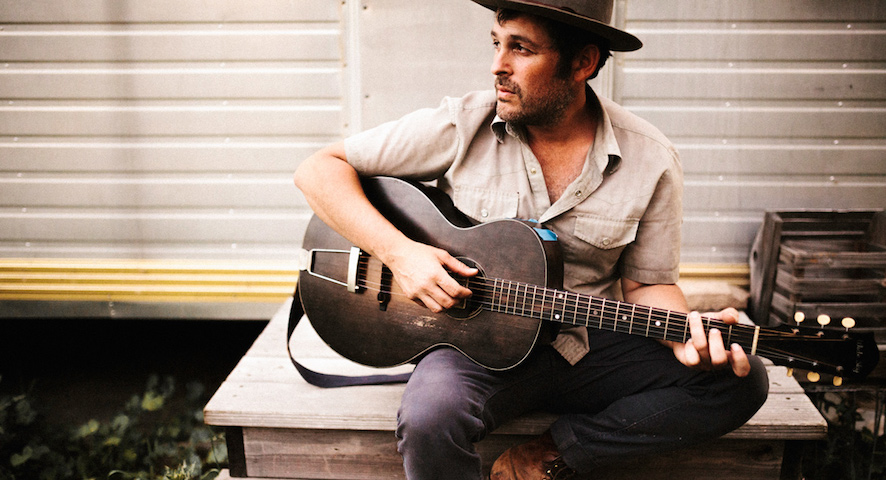When:December 17, 2018
Time:7:00 pm - 9:30 pm
Cost: $35 Plus Applicable Service Fees
PURCHASE TICKETS
More than just a regular concert, eTown is a unique live experience! Audience members will watch the eTown Broadcast recorded before their eyes, complete with performances and interviews with both of our visiting artists, as well as the eChievement Award segment, eTown's opportunity to honor everyday heroes who are doing their part to make the world a better place. You won't want to miss it!
Doors: 6:00pm
Show Start: 7:00pm
Presented by 105.5 The Colorado Sound
Gregory Alan Isakov

Many musicians have day jobs to make ends meet. However, few artists maintain the lifestyle kept by Gregory Alan Isakov. The Colorado-based indie-folk artist is a full-time farmer who sells vegetable seeds and grows various market crops on his three-acre farm, while also tending to a thriving musical career.
“I switch gears a lot,” he says. “I wake up really early in the growing season, and then in the winters, I’m up all night. I’m constantly moving back and forth.”
Isakov had an easier time balancing his two passions while making his fourth full-length studio album, Evening Machines. In between farm duties, the multi-instrumentalist wrote and recorded in a studio housed in a barn on his property. Like the farm, this studio has a communal atmosphere, filled with instruments and gear stored there by musician friends—gear Isakov always leaves on, just in case inspiration strikes.
“Sometimes I couldn’t sleep, so I’d walk into the studio and work really hard into the night,” he says. “A lot of times I would find myself in the light of all these VU meters and the tape machine glow, so that’s where the title came from. I recorded mostly at night, when I wasn’t working in the gardens. It doesn’t matter if it’s summer or winter, morning or afternoon, this music always feels like evening to me.”
As its name implies, the dark indie rock and folk populating Evening Machines possesses a dusky hue. Hushed acoustic guitar and sparse piano combine for a moody foundation that’s amplified by ornate and heavy embellishments: distant electric guitars, keyboards, pedal steel, saw, percussion, strings, banjo, and some electronic drums. Lilting background vocals intertwine with Isakov’s watercolor-streaked murmur on “Powder,” while “Where You Gonna Go” applies haunting, echoing vocal effects to his voice.
However, in a nod to the musician’s desire to strike a “balance of space and instrumentation,” these lush flourishes—loping banjo on “Dark, Dark, Dark,” ghostly pedal steel on “Was I Just Another One” and strings twirling through the waltzing “Southern Star”—enhance his precise, thoughtful arrangements. It’s an intimate album that encourages close listening and contemplation.
Evening Machines came together via an organic process rooted mostly in solitude and along side of engineer Andrew Berlin (Descendents, Rise Against). Isakov sketched out 35 to 40 songs himself during marathon studio sessions that could stretch up to 14 hours for many months. He recorded all the instruments and slowly intertwined the band: Steve Varney, Jeb Bows, John Paul Grigsby, Philip Parker, and Max Barcelow. A bevy of other contributors added additional sonic flourishes as well.
From there, Isakov whittled this large batch of music down to 12 songs, and spent a month in Oregon mixing Evening Machines with Tucker Martine (Neko Case, The Decemberists) and some final mixing with Andrew Berlin. “Andrew and I took many different approaches making this record—we used electronic instruments and more ambient sounds, and incorporated heavier elements,” Isakov says. “But I’ve always had a hard time mixing in the barn. It’s easier for me to mix something with a lot of space. That’s where Tucker was invaluable. He’s just got such an incredible approach and sense of sound.”
Isakov is no stranger to collaboration or traveling to hone his craft. In 2016, he released an album of his songs played in collaboration with the Colorado Symphony, and he tours regularly in the U.S. and Europe, performing alongside acts such as Iron & Wine, Calexico, Ani DiFranco, Passenger, Josh Ritter, Brandi Carlile, and Nathaniel Rateliff. But when the time came to make Evening Machines, Isakov discovered that his time on the road had started to take a toll.
“A lot of the music that was written for this record happened at a really difficult time of my life,” he says. “When I finished a six-month stretch in Europe I had a lot of time to be alone, and feel things that maybe I hadn’t in a long time, being on the road and with the lifestyle of touring. I experienced this new sensation of anxiety—this level of physical anxiety that I’ve been investigating ever since.” To cope, he turned to writing songs—“some of which were ways for me to ground myself during that time where it was really bad,” he says.
As an example, Isakov cites the album-closing “Wings In All Black,” a deeply personal song that’s about being resilient in the face of jarring loss. Still, not all of Evening Machines’ songs are this decisive: The album brims with elusive characters and slippery emotional situations, the kinds that linger long after their presence dissipates. “Did I hear something break?/Was that your heart or my heart?” he asks on “Caves,” while “San Luis” observes, “I’m a ghost of you, you’re a ghost of me.”
Yet Isakov’s lyrics themselves are vivid and deliberate—“I’ll leave you with this poem, about the galvanized moon and her rings in the rain,” he offers on “Too Far Away”—and devastate with economy. Take “Chemicals,” which observes, “You saw her bathing in the creek/Now you’re jealous of the water.” Whether addressing romantic love or human connection, Evening Machines has no easy answers.
Still, the album does have poignant resonance with current events. Take the string-swept opening track, “Berth,” which Isakov wrote and recorded during an all-night session. The original version of the song was 12 minutes long—and it wasn’t until Isakov and his brother, Ilan Isakov, started editing and cutting verses that the former realized “Berth” was “an immigration song, about landing in this country and throughout time”—something he knew well, as a native of Johannesburg, South Africa, who moved to the U.S. as a child.
“Writing songs is this delicate balance,” Isakov says. “My process has never been to start out saying, ‘I want to write a song about this. This is an important issue—or this is an important emotion that I’m going through—and I need to write a song about it.’ That has never happened; it’s never been part of my process. But you need to have a spark of all those, something visceral and something tangible as well to make something that sings well. Words have so much power on their own.”
Isakov’s words especially have resonated deeply both at home—he recently sold out a Red Rocks Amphitheatre headlining show—and around the world. His last studio album of new material, 2013’s The Weatherman, sold over 100,000 copies, and his entire catalog has sold well over 370,000 copies—an impressive amount for a musician who releases records via his own independent label, Suitcase Town Music.
With Evening Machines, Isakov is poised to reach an even larger audience, as it’s the first album he’s licensing to a larger record label, Dualtone. For the fiercely DIY musician—in addition to housing a studio, the barn doubles as a storage and distribution hub for Suitcase Town Music—linking up with Dualtone “wasn’t out of a place of need, but it was a place of curiosity,” he says. “I was like, ‘Well, I’ve never tried this. This could be really fun.’”
But despite this label backing, Isakov isn’t changing up his approach to music. He’ll still be touring around his farming season—and striving for a cohesive musical vision that feeds his soul. “Music helped me get through some of the hardest times,” Isakov says. “I always write in regards to an entire record. Trying to find the music that fits together as a whole piece was the most important thing to me.”
Rayland Baxter

Thoreau had Walden Pond. Kerouac had Big Sur. Rayland Baxter? He had an old rubber band factory in Franklin, Kentucky, and it suited him just fine. As one of the hardest-touring artists on the road today, Baxter’s spent most of his professional life in transit, but ever since he was a kid, he dreamed of creative seclusion someplace lonely and isolated, somewhere he could sit still and devote his every waking hour to writing without interruption or distraction. When the opportunity finally presented itself in late 2016, the Nashville native pounced.
“I packed everything in my van and moved to Franklin for three months,” says Baxter. “It was the fist time I ever got to be alone and focus solely on songs like that. All I did was write, write, write all day every day. I was obsessed.”
By the time Baxter emerged, he’d penned more than 50 tunes and crafted a detailed blueprint for his spectacular new album, ‘Wide Awake.’ Deftly produced by Butch Walker, the record infuses Baxter’s easygoing, soulful sound with British Invasion melodies and rock and roll swagger, marrying lean, muscular songwriting with adventurous, inventive arrangements. It’s a cutting, insightful collection, one that takes a sardonic view the violence, greed, and division that seem to define the modern American landscape. Rather than point a finger, though, the music holds up a mirror, offering a sober reflection of the times thoughtfully bundled in bright, infectious hooks. There’s no judgment here, only keen observation, and Baxter implicates himself as much as his neighbor through it all.
“This is an album about decision making,” he explains. “It’s about being a human at the crossroads. Do I do good or do I do evil? Do I lie or do I tell the truth? Am I going to be happy or am I going to be sad? All of these questions and emotions are things I see in myself, and they’re the same things I see in everyone else no matter where I go.”
Baxter’s built a career on capturing those sorts of timeless, deeply human sentiments, bringing colorful characters to vivid life with equal parts humor and pathos. His debut album, ‘feathers & fishhooks,’ was a critical hit praised by Interview for its “well-worn maturity,” while NPR described “Yellow Eyes,” the lead single from his 2015 follow-up, ‘Imaginary Man,’ as “close-to-perfect.” Stereogum dubbed the record “an impeccable sophomore break-out,” and Rolling Stone hailed its pairing of “whimsical narrative with often deceptively complex arrangements.” The music earned Baxter festival appearances from Bonnaroo to Newport Folk in addition to tours with an astonishing array of artists, including Jason Isbell, The Lumineers, Kacey Musgraves, The Head and The Heart, Shakey Graves, Lauryn Hill, and Grace Potter.
“The six months leading up to the release of ‘Imaginary Man,’ that was the first time I really started playing electric guitar and performing with a band,” says Baxter. “We did my first headline run and toured that album for a year-and-a-half, and the experience really opened up this whole new sound for me. It helped me figure out more of who I was as an artist and a songwriter and a traveler and a human being.”
It was with that newfound sense of self that Baxter entered Thunder Sound, the abandoned rubber band factory-turned-studio in the cornfields of Kentucky that would become his home for three months of intensive soul searching and songwriting.
“I blanketed the windows so no one could see inside,” he explains. “I laid a mattress down next to an old Wurlitzer so I had somewhere to sleep. I had a guitar, a desk with a lamp and some paper and pencils, and that was it. For fifteen hours a day, I wrote.”
When it came time to record his mountain of new songs, Baxter relocated to Santa Monica, California, where he wrangled an all-star studio band that included Dr. Dog’s Erick Slick on drums, Butch Walker on bass, Cage The Elephant’s Nick Bockrath on guitar, and piano wizard Aaron Embry (Elliott Smith, Brian Eno) on keys. A producer and artist equally at home working with massive pop stars and indie stalwarts, Walker immediately embraced Baxter’s vision for the album, and the result is a sunny and altogether charming collection. Scratch beneath the surface, though, and you’ll find it’s populated by a cast of characters who project a vision of the good life as they struggle to keep it all together behind closed doors. On the punchy ‘Casanova,’ the singer reckons with debts he knows he’ll never be able to repay, while the volatile “Amelia Baker” charts the narrator’s descent into near-madness as he pines for a starlet perpetually out of reach.
“We have this society where we’re obsessed with celebrity and living on the top of the mountain,” says Baxter. “But what’s at the top? Maybe it’s a lonely place to wake up.”
Late 2016 was a particular tumultuous time in the country, and though Baxter did his best to isolate himself from the outside world while he wrote, it was inevitable that some of the chaos would seep in. On album opener “Strange American Dream,” a chiming piano and spare Motown groove give way to lush harmonies and unexpected melodic twists as Baxter sings, “I close my eyes and realize that I’m alive inside this strange American dream.” Meanwhile, the soaring “79 Shiny Revolvers” finds him reflecting, “you really wanna save the world, man / well, I wanna save it, too / we can blow ’em away / the American way.”
While ‘Wide Awake’ offers plenty of broad, wide-angle musings, some of its most arresting moments arrive bundled inside deeply personal memories and snapshots. The heartfelt “Everything To Me” is a tender tribute to family (Baxter’s father Bucky, who played pedal steel with Bob Dylan and Ryan Adams among others, contributes to the record), and the laidback “Let It All Go Man” is a reminder that there’s beauty in simply being alive.
“I actually started that song two years ago on a trip to South America,” says Baxter. “I was sitting on the porch of a house in this little town in Colombia, and I was all alone playing a gut string classical guitar, just staring out at the ocean and the beach in the middle of the night. It made me realize how much unnecessary stuff we hold on to, all the grinding away we do chasing success and money and missing the big picture. It made me realize what an incredibly beautiful gift it is to be human.”
That empty South American beach may have been a world away from the rubber band factory in Kentucky, but for Baxter, the effect was the same. The solitude offered a chance to observe, to reflect, to grow, to appreciate, and most importantly, to write.
